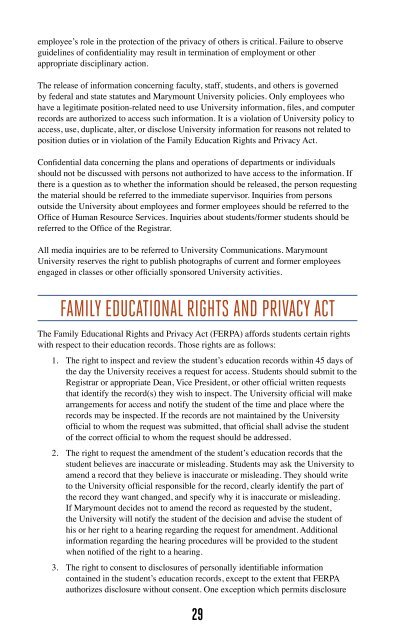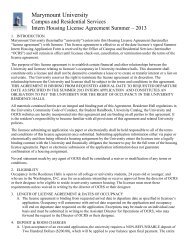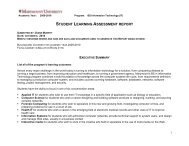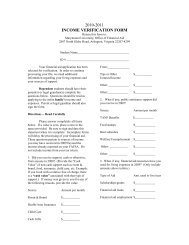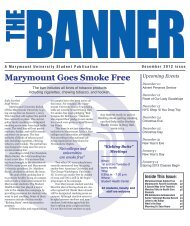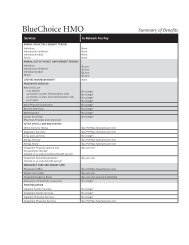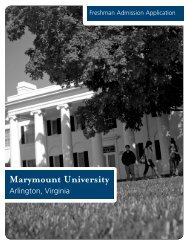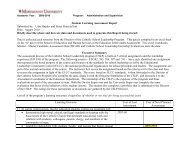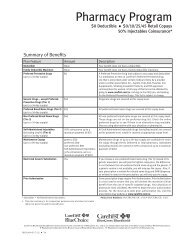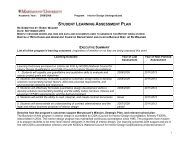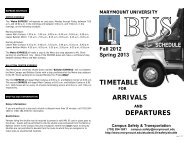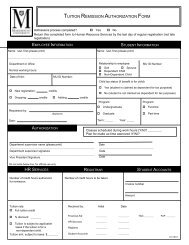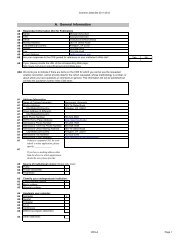EmployEE Handbook - Marymount University
EmployEE Handbook - Marymount University
EmployEE Handbook - Marymount University
You also want an ePaper? Increase the reach of your titles
YUMPU automatically turns print PDFs into web optimized ePapers that Google loves.
employee’s role in the protection of the privacy of others is critical. Failure to observe<br />
guidelines of confidentiality may result in termination of employment or other<br />
appropriate disciplinary action.<br />
The release of information concerning faculty, staff, students, and others is governed<br />
by federal and state statutes and <strong>Marymount</strong> <strong>University</strong> policies. Only employees who<br />
have a legitimate position-related need to use <strong>University</strong> information, files, and computer<br />
records are authorized to access such information. It is a violation of <strong>University</strong> policy to<br />
access, use, duplicate, alter, or disclose <strong>University</strong> information for reasons not related to<br />
position duties or in violation of the Family Education Rights and Privacy Act.<br />
Confidential data concerning the plans and operations of departments or individuals<br />
should not be discussed with persons not authorized to have access to the information. If<br />
there is a question as to whether the information should be released, the person requesting<br />
the material should be referred to the immediate supervisor. Inquiries from persons<br />
outside the <strong>University</strong> about employees and former employees should be referred to the<br />
Office of Human Resource Services. Inquiries about students/former students should be<br />
referred to the Office of the Registrar.<br />
All media inquiries are to be referred to <strong>University</strong> Communications. <strong>Marymount</strong><br />
<strong>University</strong> reserves the right to publish photographs of current and former employees<br />
engaged in classes or other officially sponsored <strong>University</strong> activities.<br />
Family Educational Rights and Privacy Act<br />
The Family Educational Rights and Privacy Act (FERPA) affords students certain rights<br />
with respect to their education records. Those rights are as follows:<br />
1. The right to inspect and review the student’s education records within 45 days of<br />
the day the <strong>University</strong> receives a request for access. Students should submit to the<br />
Registrar or appropriate Dean, Vice President, or other official written requests<br />
that identify the record(s) they wish to inspect. The <strong>University</strong> official will make<br />
arrangements for access and notify the student of the time and place where the<br />
records may be inspected. If the records are not maintained by the <strong>University</strong><br />
official to whom the request was submitted, that official shall advise the student<br />
of the correct official to whom the request should be addressed.<br />
2. The right to request the amendment of the student’s education records that the<br />
student believes are inaccurate or misleading. Students may ask the <strong>University</strong> to<br />
amend a record that they believe is inaccurate or misleading. They should write<br />
to the <strong>University</strong> official responsible for the record, clearly identify the part of<br />
the record they want changed, and specify why it is inaccurate or misleading.<br />
If <strong>Marymount</strong> decides not to amend the record as requested by the student,<br />
the <strong>University</strong> will notify the student of the decision and advise the student of<br />
his or her right to a hearing regarding the request for amendment. Additional<br />
information regarding the hearing procedures will be provided to the student<br />
when notified of the right to a hearing.<br />
3. The right to consent to disclosures of personally identifiable information<br />
contained in the student’s education records, except to the extent that FERPA<br />
authorizes disclosure without consent. One exception which permits disclosure<br />
29


